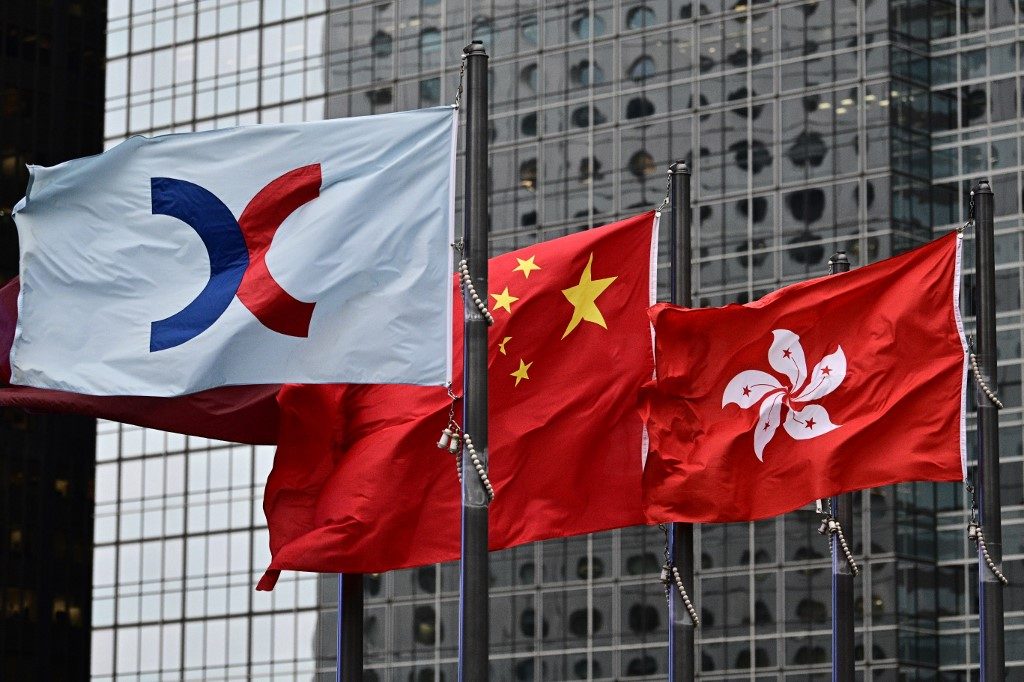SUMMARY
This is AI generated summarization, which may have errors. For context, always refer to the full article.

HONG KONG – Real estate companies and financials were among the biggest victims in a stock market sell-off in Hong Kong on Friday, May 22, after China submitted a security law proposal for the city that has fanned fears of fresh protests.
With the economy already on the ropes because of the coronavirus, investors fled for the hills with many worried about Beijing’s increasing influence in the semi-autonomous finance hub and what that could mean for doing business there.
At its annual National People’s Congress, China’s lawmakers put forward a proposal to enact new legislation to strengthen “enforcement mechanisms” in Hong Kong, which was rocked last year by 7 months of massive and sometimes violent pro-democracy protests that crippled the city.
Plans for the proposal had sparked warnings of “the end of Hong Kong” and fears of further unrest, while the US State Department said the move was “highly destabilizing, and would be met with strong condemnation from the United States and the international community.”
US President Donald Trump promised a response, saying: “I don’t know what it is, because nobody knows yet. If it happens, we’ll address that issue very strongly.”
Markets are now worried that the city’s freedoms – unseen on the mainland and protected by an agreement made before Britain handed the territory back in 1997 – could be curtailed.
US lawmakers have already passed a law that would strip the city’s preferential trading status in the United States if it no longer enjoys autonomy from the mainland.
The virus has sent the Hong Kong economy into a tailspin, fueling a record 8.9% contraction in the first 3 months of the year, with worse expected in the current quarter.
“The very real threat now is the return of mass protests to the streets of Hong Kong, a downgrade in trade status with the US and potentially an exit of large companies from the SAR (Special Administrative Region),” said OANDA’s Jeffrey Halley. “Overhanging this, are concerns that China and the United States are about to engage in a new round of trade wars.”
The Hang Seng Index fell more than 5% on Friday.
Property firms – already under pressure from the virus – were battered in early trade.
Sino Land collapsed more than 10%, Sun Hung Kai Properties lost 7.8%, and New World Development dropped 9.8%, while Wharf Real Estate Investment shed 9.4%.
Swire Pacific and CK Asset Holdings were each more than 8% off.
And the picture was no less gloomy for financials, whose profits in the city could be threatened by companies leaving.
Market heavyweight HSBC lost 6.9% and BOC Hong Kong shed 7.8%, while insurance giant AIA was down more than 9% and China Life dropped 6.8%.
Subway operator MTR Corp, which was battered during the protests as its stations were targeted by demonstrators, dived nearly 10%.
The Hong Kong dollar, which has been at the strong end of its trading band with the US dollar for several weeks, also dropped as dealers began selling the unit.
“Traders around the world are playing the waiting game to see details of the new Hong Kong law to gauge how severe the terms are,” said Stephen Innes of AxiCorp. “And more specifically, the White House response to decide whether Hong Kong’s special economic status will be affected.” – Rappler.com
Add a comment
How does this make you feel?
There are no comments yet. Add your comment to start the conversation.